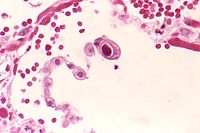
Photo from wikipedia
The development of antiviral‐resistant cytomegalovirus (CMV) infection complicates the management of transplant recipients. We describe the case of a 65‐year‐old male who developed CMV disease on valganciclovir prophylaxis (donor CMV… Click to show full abstract
The development of antiviral‐resistant cytomegalovirus (CMV) infection complicates the management of transplant recipients. We describe the case of a 65‐year‐old male who developed CMV disease on valganciclovir prophylaxis (donor CMV IgG positive, recipient CMV IgG indeterminate) 30 days after combined liver–kidney transplantation for alcoholic cirrhosis and hepato‐renal syndrome. After an initial complete response to treatment dose oral valganciclovir, he developed recurrent CMV viraemia. Resistance testing revealed a UL97 mutation with in‐frame deletions of codons 595‐596. He was treated successfully with foscarnet and reduction in immunosuppression. This mutation has not been described previously and was suspected to confer ganciclovir resistance. Ganciclovir resistance occurs most commonly due to mutations in the UL97 or UL54 genes, which encode a protein kinase and a DNA polymerase, respectively. The UL97‐encoded protein kinase phosphorylates ganciclovir to ganciclovir triphosphate, which competitively inhibits viral replication. Mutations in the UL97 gene are typically point mutations or deletions. We describe a new mutation, del595‐596 in the CMV UL97 gene, occurring in the context of clinical treatment failure with standard and double‐dose ganciclovir, and successful virological control achieved with foscarnet. This mutation is likely to result in ganciclovir resistance, although recombinant phenotyping is required for confirmation.
Journal Title: Transplant Infectious Disease
Year Published: 2019
Link to full text (if available)
Share on Social Media: Sign Up to like & get
recommendations!